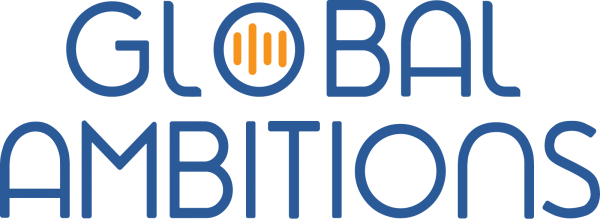With Amy Grace O’Brien, Senior Linguistic Quality Manager at Adobe
Below is an automated transcript of this episode
Antoine Rey (Host) 00:17
Hi everyone, I’m Antoine Ray and I will be your host today for this Global Ambitions podcast episode. And today my guest is Amy Grace O’Brien, who is a Senior Linguistic and Quality Manager at Adobe, and today we’re going to be talking about terminology management and linguistic quality. Amy, welcome to the program.
Amy Grace O’Brien (Guest) 00:36
Thank you for having me, Antoine.
Antoine Rey 00:38
Great Amy. You’re very famous in the industry for your knowledge around terminology. Tell us maybe right away about terminology at Adobe before Amy, I guess, and then after Amy, of course.
Amy Grace O’Brien 00:50
Yeah. So I came in as a translator. I was like Adobe acquired the company I was working with and, long story short, I’d fostered an interest in linguistic quality and terminology. And it’s funny because just recently I thought this was good timing the terminology maturity model was just released by CSA a couple of weeks ago, and so I can actually sort of give you some benchmarks of sort of where we were at, rather than going into the nitty gritty. But essentially, when I came in, terminology was definitely, you know, in use at Adobe. Thankfully it was in our TMS, in World Server, but it was very basic. There wasn’t really as much of a strategy as there is today certainly not and metadata was definitely not being used as much as it was. And unfortunately, terminology was: some of it was in our DMS and some of it was just thrown into Excel spreadsheets and hoped for the best. And then the vendor partners were using their own term databases as well. So I kind of brought all of that together and put it into a single source of truth.
01:48
A few years later, we’ve now moved to Quickterm. We’ve done like an entire upheaval of it. We’ve done audits, cleanups, things like that, but it took a while to get there. I don’t want to overlook how long it took to get there because I don’t want your listeners to think that. Know, this was a super simple thing to do. It took a while and I’m really lucky that. You know my director and my teammates helped me get there. You know they were all for it and saw the importance of terminology to do that. It’s something that’s really overlooked in the industry, but it is a pivotal role in ensuring consistency, clarity, and quality.
Antoine Rey 02:22
Yeah because it’s pretty rare nowadays to have like someone whose title and role I mean terminology is for a large organization, but we’ve seen like Kara Warburton at IBM and a few other people in the industry. So it’s great to see Adobe really giving this like a serious approach. But it’d be interesting to understand so from your point of view now. So you move like from whatever process you had before into quick term, presume. This is a lot around like governance around term validation.
Amy Grace O’Brien 02:52
Yeah, if we, if we go back to sort of like the maturity model, I’d say we were probably at like a what this maturity model is like a two point two, two point five. So now I’d say we’re like a 3.5 with four in mind. Right.
Antoine Rey 03:04
Which is a managed verse towards optimized right?
Amy Grace O’Brien 03:08
Exactly. Yeah. Yeah, it was a massive overhaul and we had to bring like substantial improvements to everything we were doing, moving from spreadsheets and it was honestly like I’m going to show my age here, but it’s probably going comparisons from going from like dial up to fiber optic right from going from these to quick term to something actually, and difference has been quite astounding. Because when you have something that everybody can go to, that everybody can refer to and they can see that it’s managed, the feedback loops, certainly on the vendor side, are much better. They can see the impact, they’re actually more proactive in the quality and things like that. There’s fewer linguistic errors, less support tickets due to misunderstandings, a lot less back and forth from my teammates from the vendor partners where they’re trying to clarify what something is. It’s all sort of already in the term base.
Antoine Rey 03:52
And how do you make it become the go-to kind of central place for not only working with your LSPs, I guess, but for your internal stakeholders and for Adobe community in general, to say that’s the gold standard now, instead of us creating our own terms, and then that is validated by the customer community, I guess as well?
Amy Grace O’Brien 04:16
So you have to make a lot of noise, unfortunately. You have to pop your head in the right places in the right offices, get to know the right people. The content strategy team at Adobe it’s quite a new team. I mean it’s probably five years old now and I remember the first week that our content strategist had started, the first official one of the team that would have been brought in. It was in San Jose and I happened to be in San Francisco and I happened to be in town that week. So I got into that office and I was actually looking for somebody else. I didn’t even know that this team existed and I happened to be in the office and he pinned him down and was like oh, you should talk to this guy.
04:51
And basically this poor guy it was his first week and he was learning about like at Adobe you know, we have like over 100 products. You know he had a lot to learn and he was very much on the DME side and I’m on the DX side well, like in a different business unit, essentially in Adobe, and I was just sort of like vomiting all of this information at him about how important it is that we get things right. You know we shift left, we get things right. And this poor guy, he did his best but he then went on to hire more and more people.
05:19
But from that beginning, localization that team is excellent now. They always consider us. They always come to us and ensure that you know these new ways of saying things, these new sort of like components on the source side. They check hey, will this localize? Well, I’m considerate of X, Y, Z. They learn a lot from us and we’ve learned a lot from them.
05:39
So it’s all about, like you know, getting your head in content strategy, branding, I harass branding like there’s no tomorrow. Make sure that you’re on the right mailing list, make sure that you’re on the right threads and in the right conversations and talk to your colleagues. My colleagues own the localization of each of the products. It’s all about, I guess, like positive brand management right, like branding yourself and branding the importance of terminology. When they come out of meetings, if anything about feature names is mentioned, they forward that to me or get me in the meeting if needs be. And I’ve done some progress. I’ve definitely not. I don’t want this to come out that I’m like fully as good as it could be. It definitely could be better, but I think if I was a smaller company it would be a lot right. But we have we’re very we have a lot of products at Adobe, so I have a niche that I can try and wrap my little control of, and I’m only one person. If I was a team, that would be way better as well.
Antoine Rey 06:31
Sure, and that’s interesting what you’re saying about the maturity side of things there, because similarly with localization programs as well as with terminology here, I can see the parallel there. I would advise our clients to always evangelize and brand yourself right away, you know, get the stickers, get the t-shirts, you know, and say this is who we are and this is the name, as opposed to localization services right over the world kind of thing, because otherwise you become what we call the Cinderella of this industry and we don’t want to be that. We’re like more of a strategic function that helps your end clients. In this case it seems that in a way to achieving that which is great to hear, so like for everybody who’s listening again, push the doors, go and meet the people, brand yourself, organize some lunch and learns or brand bags and you know, regular meetings where you invite your sphere of influence.
Amy Grace O’Brien 07:26
I would say go with data as well, as much as possible, if you can go with, like their boo-boos, that they’re messed up to be like you know that has an impact, right, and it’s not, it’s not fun. But if you can be, you know, be polite about it and show like hey, you know we got this and you’re kind of expecting us to localize this in the quality translations, but we’re getting this source like hey, could we like work together to find improvements here?
Antoine Rey 07:51
So, talking about data, because you’re absolutely right here like from what you’ve been doing for the past few years there with Adobe, have you measured or realized the impact and the KPIs that you’re looking at for Adobe in terms of terminology?
Amy Grace O’Brien 08:04
So we’re pushing really hard right now on harmonization and because for a long time people weren’t seeing the necessity to document as early as possible. Things were inconsistent, and so we’re now harmonizing to the max. And you know, normally you want things to be getting lower, but it won’t be lower until it’s first hit a peak right. So we’re working max on fixing things. So there’s actually more tickets being logged because we’re finding things and you don’t know what you don’t know right. So now we’re detecting these issues because we’re actually logging them. So we’re building the trust. I think the customers right is essentially we’re calling things the same thing. The customers going in and working between lots of different products and it’s being called the same thing throughout that entire customer journey, and that’s previously and previously we didn’t have that. There are areas where it wasn’t necessarily the case, but we didn’t know about it. Now we know about it. So in terms of KPI, technically we actually have some more bugs because we’ve now detected it, but we’re hoping that in a few years, because we’re now doing this, that will then go down. So check back in with me in a few years to see.
Antoine Rey 09:12
And is it difficult, or can you already, at this stage or maybe later, assess the impact on the brand and the perception of quality within the Adobe product suite?
Amy Grace O’Brien 09:25
Yeah, the business unit I’m on as well is these products overlap with each other.
So on the experience cloud side of things analytics, AM, all that they sort of work within each other and certainly the brand and the feature names and things like that, they’re a lot clearer. It’s a lot clearer now in terms of what can and cannot be localized. The customer’s getting a much more local feel, I think, on the product. So previously there wasn’t a strategy around like name be localized or not, and now there is and it’s defined and it’s clear and that means the customer’s getting actually what they want to see when they’re opening up the product. They’re seeing it in the relevant like feature names tailored. So rather than it just being like an English word, it’s actually like a descriptive word, so the person understands what it is, because previously because there wasn’t a strategy, it was more sort of like oh, this is probably a product name, so we shouldn’t, because there wasn’t that discussions being had, branding and terminology. And now there are and actually they’re getting a more local feel and a better customer experience, in my opinion.
Antoine Rey 10:25
And listen, no conversation on this would be complete if we didn’t mention AI, I guess. And so what’s happening on that front, from a terminology and quality perspective?
Amy Grace O’Brien 10:34
Sure, sure. So at Adobe, we had to go through, we’ve had to jump through a few legal loopholes, which I’m sure at most large companies you’d have to do as well. You know the company has to get the right model that they want or the right tool that they want to use. So we’ve had to wait a little while there. But we’ve just started sort of playing around or in sort of, I would say, the playground phase of it.
10:54
I have a lot of use cases in mind for terminology. Particularly terminology extraction is going to be key. Quickterm actually already has a connector with OpenAI, Azure, but in the next year or so, Azure OpenAI, which is what we’re using manage our own prompts and generate definitions, context sentences, be able to pull that probably like directly from Adobe websites and things like that. That’s what I’m really looking forward to, tailoring it to what we need and I’m also working with other corporate terminologists in this. A little shout out here to Terminogs so that’s a organization where corporate terminologists discuss and meet. Like what’s going on? The industry, an iso initiative as well for that. AI with terminology there’s lots of use cases, but there’s different areas. Right, there’s using AI for terminology management and then the opposite, which is using terminal management for AI, like for LLMs right, and what I’m currently interested right now is using AI for terminology management. That, I think, will change the game a lot. It’s going to do a lot of the grunt work. I’m happy about that.
12:04
There’s a lot of niche use cases I have as well within my team. So, for example, all this harmonization work I was telling you about, some of our team wants us to be more transparent with the user and the clients about that, about hey, fyi, we changed this word in French to this other word in French.
12:20
So you’re going to see that in the UI and right now we’re doing that by Jira’s right. So we’re logging tickets, changing it, and then I want to kind of create like a release notes based off of those Jira’s. So I want to have AI sort of help me go from like detecting all of those closed tickets and whenever they’re closed, then sort of generating like all of those closed tickets and whenever they’re closed, then sort of generating like a summary of it get over to a release note so that, rather than me manually got looking every month at all the tickets, if it can be on the fly, sort of combining automation and AI there. That would be really cool. I’m excited to what’s going to come for there because it’s going to explode, what you can do with it really, and it’s going to change the game for sure.
Antoine Rey 12:58
Yet another area to revisit in a year or two with you. Well listen, amy. Thank you very much for coming on the program. I really appreciate it. I think that’s very interesting for all the listeners to understand how terminology is done at a large enterprise company, and I’m sure everybody will learn a lot. So thank you again.
Amy Grace O’Brien 13:15
Thank you Thanks for having me Appreciate it.





